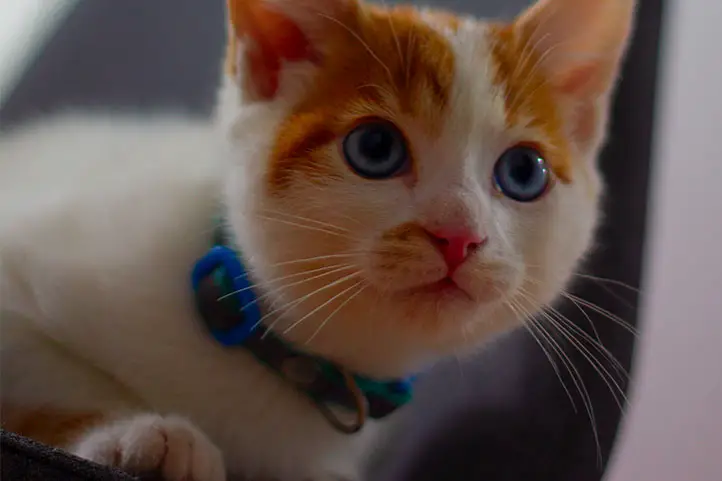Translated by Nick R
Thanks to cartoons and television in general, it’s believed that cats love milk and that they drink it all the time.
However, this is wrong, in fact, cow’s milk could even cause them some health problems. Because if we think about it…there is no reason to give cat milk from another animal.
Anyway, here I’ll explain what you should know about giving or not giving milk to felines.
Table of Contents
Breastfeeding in cats
First, let’s talk about nursing in cats. Breastfeeding is really important for the proper development of kittens, as breast milk provides the babies with essential nutrients they need to grow healthily.
Breast milk provides hydration, vitamins, proteins, and carbohydrates to give them energy and also helps them to create antibodies to protect against diseases.
The lactation period lasts about 6-8 weeks. From birth until the 3rd or 4th week, the kittens are fed only on their mother’s milk, since at that time their first teeth grow and they can start to eat solid food little by little.
From that moment on, the mother starts rejecting them as they start hurting her by suckling, so the cats will look for a complementary source of food. Many times they eat their mother’s food, which should be formulated for the stage of life they are going through, so the felines will have the nutrients they need.
Normally, the food includes on its packaging what type of cats it is recommended for, so it will probably say “pregnant cat” or even you can find special food for the kitten’s age.
Up to 2 months old kittens will consume both mother’s milk and solid food until they stop breastfeeding completely.
You can help them eat by mixing the feed or concentrate with warm water or kitten milk, making it much easier for them to feed.
Early weaning
You may have adopted a feline that has not yet completed its nursing period, or even the mother may be having trouble nursing, perhaps because her milk is not coming in.
When a cat has no milk to feed her babies, it can be due to bad feeding; it can also happen if she is a new mother; due to mastitis, which is an inflammation of the mammary glands, or even on some occasions due to a postpartum infection, or due to some other health problem she suffers from.
If this is the case, you should go to the vet to have her examined and treat the problem, a veterinarian may recommend a special powdered milk formula for cats that you can give to the kittens with a teat.
You can get this milk in veterinary stores, just mix it with a little warm water and give your cat the recommended amount.
Early weaning not only has an impact on the health and growth of cats but also on their behavior. According to a study published in 2017 in the journal Scientific Reports, early weaning can lead to “deficiencies in social behavior, increased anxiety and aggression.”
Therefore, it’s recommended to comply with the full breastfeeding period so felines can learn social behaviors from their mother and siblings.
On the other hand, you will notice when your cat is ready for weaning because the mother’s milk is no longer enough to keep the kitten satiated and he will ask for more food, thus he will start to be interested in solid food.
Lactose intolerance
Adult cats generally don’t digest lactose well, because as they grow up, they create intolerance to the sugar found in milk (which is a complex sugar), since their organism is not made to differ from this type of food.
Let me elaborate, during the breastfeeding period, cats produce an enzyme called “lactase” that helps them to digest the lactose found in milk, however, after the weaning period, their body stops producing it and this makes it difficult for adult cats to digest this food.
Some cats have no problems drinking it, but it usually does happen and can produce the following symptoms.
Symptoms
- Vomiting.
- Diarrhea.
- Gas.
- Swelling in the abdominal area.
On the other hand, they may also be allergic to lactose, intolerance is more common, but here are the symptoms you should pay attention to.
Lactose allergy symptoms
- Alopecia (loss of coat).
- Desquamation of the skin.
- Diarrhea.
- Vomiting.
- Otitis.
- Respiratory problems.
Dermatological signs.
Mother’s milk vs. cow’s milk
The composition of mother’s milk is specially made for the health and proper development of kittens at that stage of life. Other types of milk, such as cow’s milk, do not have the same components since it is made for calves and not for cats.
According to this article called Nutrition in Cats: From Gestation to Weaning, “cat milk has 106 Kcal/100 g compared to cow milk which has only 65 Kcal/100 g.”
On the other hand, the amount of protein and fat in cow’s milk is much lower, so it would not meet the needs of kittens.
Nutritional table of cow’s milk
| water | 77% to 80% |
| Fats | 6% |
| Proteins | 7% |
| Lactose | 3% |
Nutritional table of special milk for cats (El gatolac nutritional table)
| Raw protein | 34% |
| Humidity | 10% |
| Fiber | 4% |
| Minerals | 5% |
So, can I give cow’s milk to a cat?
Cows’ milk won’t do your cats any good and they don’t really need it as it doesn’t meet their nutritional requirements.
If for some reason your kitty needs supplementation, always ask your veterinarian before you start giving her milk.
Of course, it must be special milk for felines and they will only need it until the end of the lactation period, adult cats don’t need milk but a quality and adequate food suitable to their life stage.


